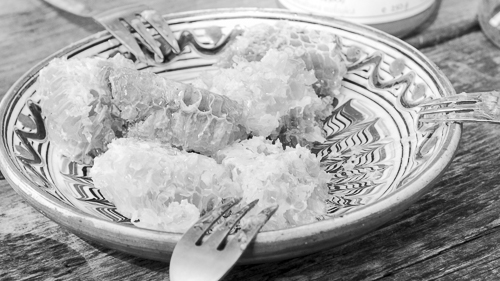Wilhelm Tartler is a young Saxon, who after a stay in Germany, has decided to stay in Romania. We met him, his German wife and their young daughter on the outskirts of the village of Hambra next to the Saxon church from which they rent a house. In fact, the house is surrounded by a big garden with some rundown sheds, lots of beehives, Transylvanian chickens, a vegetable garden, and some sheep.
Wilhelm got acquainted with bees for the first time when he took swarming bees from a tree in 1996, and started producing honey in 1999. He and his wife are producing organic honey with the help of volunteers. During our visit, 3 volunteers were busy working, two of which were making honeycombs by melting and moulding old beeswax, forming a diaphragm which is called a honeycomb. Later, they would be placed in the beehives where the bees would use the honeycombs as a base on which they construct their hexagonal cells. The third one was making a solar oven for melting beeswax.
This farm accepts volunteers all year as described here.
Wilhelm willingly showed us his beehives, holding his one-year old daughter in one arm, he deftly opened a beehive. A bit surprising given that bees could have seriously hurt his daughter, but obviously his bees are so peaceful that it’s safe. After having been shown around their property, we were offered a wide selection of their tasty honey products, which they sell in select shops all across Romania, but also to Germany, the Netherlands, and Sweden. Their products include
- honey from diverse forest flowers
- acacia honey
- acacia honey with vanilla
- acacia honey with walnuts
- rapeseed honey
- sunflower honey
- limetree honey
- pollen
- propolis – a reddish resinous cement collected by bees from the buds of trees
In order produce all these types of bee products, they have a stationary set of beehives in a nearby forest, while the other ones are moved around Romania by a trailer in summer. Sometimes they go to the Danube delta overnight, other times they move the bees tens of kilometers in order to take advantage of the local vegetation.
Being a passionate beekeeper, he also told us that he selects 2-5 larvae from a good hive with good honey and healthy bees, feed them royal jelly (a honey bee secretion) together with poly-flora honey. This will give 4-5 queen bees, which can be used in other hives.
In winter, the bees stay in peace, in a bad year they must be fed.
Wilhelm is also a passionate fruit grower and he has about 60 varieties of apple trees in addition to cherry trees, plum trees, and pear trees. He’s arranging grafting courses in spring where he teaches how to graft young apple tress to old ones and spreading the new ones if they are good. He’s also growing raspberries, blackberries and blackcurrants.
We also visited their chicken coop where tiny Transylvanian chickens were moving freely around as they pleased.

